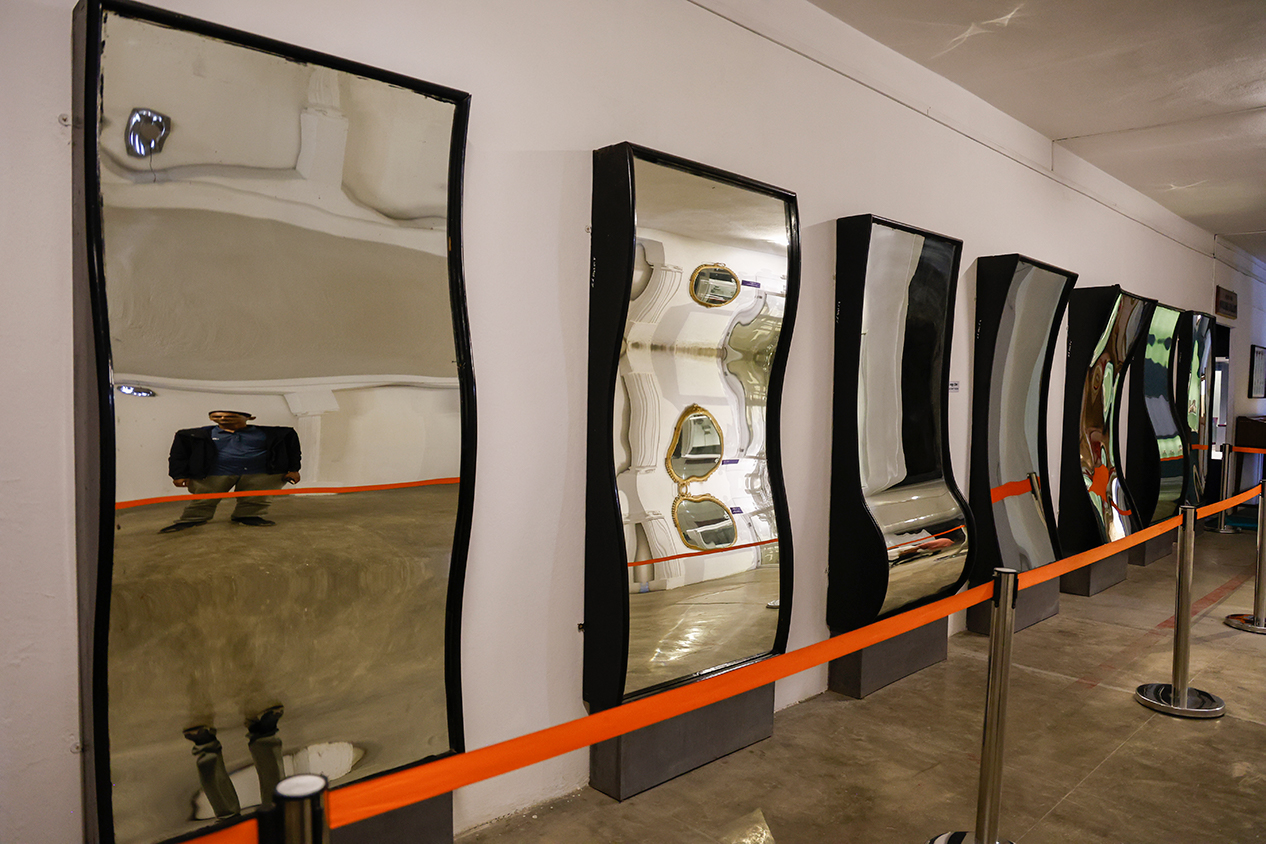
फिचर
२०७२ सालमै डेरा सारिएका कारण जोगिए शताब्दी पुराना सामग्री

अंग्रेजहरूको शासकीय रवाफबाट प्रभावित नेपालका राणाशासकहरूमा आफूलाई असाधारण देखाउने होडबाजी थियो। काठमाडौँ, पाल्पालगायत ठाउँमा निर्माण भएका भव्य राणाकालीन दरबारहरू यस्तै स्पर्धाका प्रमाण हुन्।
राणा प्रधानमन्त्री चन्द्रशमशेरले निर्माण गर्न लगाएको सिंहदरबार यसको सबैभन्दा बलियो उदाहरण हो। १९६० सालमा बनेको यो दरबारबारे लेखक ग्रेटा राणाले सिंहदरबारलाई युरोपका केही दरबारसँग मिल्दोजुल्दो भनी तुलना गरेकी छन्। राणाज् अफ नेपाल पुस्तकमा उनले लेखेकी छन्, ‘सिंहदरबारले मलाई सधैँ अंग्रेजहरूको विशाल ‘च्याट्सवर्थ हाउस’ वा ‘वोबर्न एब्बे’ को सम्झना दिलाउँछ। मलाई लाग्छ, यो महाराज चन्द्रको केही अंग्रेजका कुलीन घरहरूको भ्रमणको प्रभाव हो।’ सिंहदरबारलाई उनले फ्रान्सको ‘साटो दे भर्सायल’ को ढाँचामा निर्माण गरिएको दरबारसमेत भनेकी छन्।
राणाशासकहरूले युरोपेली शासक र दरबारको भव्यताबाट प्रभावित मात्र नभई उनीहरूको ठाँटबाँट र रहनसहनको नक्कलको कोसिससमेत गरे। राणाकालीन दरबारहरूको बाह्य–भित्री बनोट, वास्तुकला, कलाकृतिदेखि भवन सजाउन राखिएका चिजवस्तुमा यो नक्कल झल्किन्थ्यो। यसको एक अनुपम उदाहरण हो, सिंहदरबारको बेलायती बैठक (स्टेट हल)। बेलायती बैठक सिंहदरबारको पश्चिम मोहडाको अग्रभागका रूपमा रहेको थियो।
युरोप भ्रमणका क्रममा चन्द्रशमशेरले भव्य दरबारभित्र ठूला बैठक र भोज गर्न मिल्ने हल देखेका थिए। बेलायती बैठक पनि यस्तै थलो हो, जहाँ देशीविदेशी कूटनीतिकर्मी/राजनीतिकर्मीसँग अन्तरंग संवाददेखि सन्धि, सम्झौतासम्म हुन्थ्यो।
यही हलमा राजा वीरेन्द्र र रानी ऐश्वर्यको स्वयंवर भएको थियो। बेलायती रानी एलिजाबेथलगायत विभिन्न देशका राष्ट्रप्रमुखको आगमन हुँदा राजकीय बैठक तथा राजकीय भोज हुने थलो पनि यही हो। नाम बेलायती बैठक भए पनि यहाँ बेलायती मात्र होइन, युरोपभरका सामग्रीको प्रतिनिधित्व थियो। इटालीबाट ल्याइएको संगमरमरको फर्स, बेल्जियमबाट ल्याइएका रंगीन ऐनाहरू, मुरानोबाट ल्याइएका क्रिस्टलका झ्यालबत्ती र बेलायतबाट आयातित रंगीन काँचले बनेका झ्याल–ढोकाहरू थिए। यो भव्य हलका भित्तादेखि छानासम्म विदेशी दरबारहरूमा जस्तै आकर्षक रूपमा कुँदिएका कलाकृति थिए। यहाँभित्र सजाइएका फर्निचरहरू युरोपबाट कलकत्तासम्म पानीजहाजमा र त्यहाँबाट भरियाहरूलाई बोकाएर काठमाडौँसम्म ल्याइएका थिए।
यसरी भित्र्याइएका सामानमध्ये क्रिस्टल क्लक विशेष मानिन्छ। भनिन्छ, यो घडी संसारमै दुइटा थियो। एउटा पेरिसको भर्साइल दरबारमा र अर्को सिंहदरबारमा। हालैको जेन–जी आन्दोलनमा सिंहदरबार जल्दा यो घडी संयोगले बचेको छ। २०३० सालको सिंहदरबार आगलागी र २०७२ सालको भुइँचालोमा समेत यो घडी बचेको थियो।

क्रिस्टल घडी। तस्बिर : बिक्रम राई/नेपालन्युज
२०७२ सालको भुइँचालोले सिंहदरबारका केही महत्त्वपूर्ण सामग्रीलाई संरक्षणका खातिर छाउनीस्थित राष्ट्रिय संग्रहालयमा स्थानान्तरण गरिएको थियो। राष्ट्रिय संग्रहालयका अधिकृत सुवासकृष्ण डंगोलका अनुसार ती सामग्री पुरातत्त्व विभागले मुचुल्का बनाई संग्रहालयमा सारेको थियो।
सम्पदाविद् रवीन्द्र पुरी चन्द्रशमशेरले आफ्नो बेलायती बैठकलाई विशेष बनाउन भर्साइल दरबारमा देखेजस्तै घडी फ्रान्समै बनाउन लगाई बडो मिहिनेतका साथ सिंहदरबार भित्र्याएको बताउँछन्। “यो घडी जलेको भए दुर्भाग्य हुन्थ्यो,” उनी भन्छन्।
पुरीका अनुसार सन् १९०८ मा चन्द्रशमशेर युरोप भ्रमणका बेला जे जे कुराबाट आकर्षित भए, आफ्नो दरबार सजाउने तिनै कुरा ल्याए। बेलायती बैठकको साजसज्जाको स्मरण गर्दै थप्छन्, “बेलायती बैठकभित्र जति सामान थिए, ती सबै आँखा लोभ्याउने खालका थिए। भित्ता, पर्खाल, झ्याल, चित्र, बत्तीदेखि मैनबत्ती राख्ने होल्डरसम्म सबै एकसेएक। ऐनैऐना भएको कोठा त झनै चित्ताकर्षक!”

हाल राष्ट्रिय संग्रहालयमा रहेको सिंहदरबारस्थित बेलायती बैठकको घडी र ऐना। तस्बिर : बिक्रम राई/नेपालन्युज
बेलायती बैठकमै २० फिटभन्दा अग्लो सिसाको बत्तीको झरना (लाइट फाउन्टेन) पनि फ्रान्समै विशेष रूपमा डिजाइन गरेर ल्याइएको थियो। पत्रकार कनकमणि दीक्षितले लेखेका छन्, ‘करीब १५ फिट लम्बाइ र २५ फिट उचाइको यस बैठक झार–पानस तथा ऐनाको फोहोराले सुसज्जित छ भने ठूला ऐना तथा ‘नियो-क्लासिकल स्टाइल’ ले सिँगारिएको छ। हलबाहिर पश्चिमपट्टिको ठूलो बार्दलीबाट सिंहदरबारभित्रको लाम्चो पोखरी र हरियाली तथा मूल गेटबाहिर भद्रकाली र धरहरातर्फको दृश्य देखिन्छ।’
हाल संग्रहालयमा संरक्षित क्रिस्टल घडीको विवरणमा लेखिएको छ, ‘श्री ३ चन्द्रशमशेरले सिंहदरबारस्थित बेलायती बैठक सजावटका लागि खरिद गरेको।’
पारदर्शी स्ट्यान्डसहितको घडी करिब चार फुट अग्लो छ। घडी स्ट्यान्डको तल्लो भागमा ल्याटिन अक्षरमा १९औँ शताब्दीका रोमन कवि होरेसको कविताको अंश लेखिएको छ। जसको अर्थ हो– आफ्नो देशका लागि मर्नु गौरवपूर्ण र सुखद कुरा हो।
भुइँचालोपश्चात् बेलायती बैठकबाट संग्रहालयमा सुरक्षित रूपमा सारिएका क्रिस्टल घडीसँगै दुई वटा ऐना र नौवटा लाफिङ ग्लास पनि थिए। राणाहरूले मनोरञ्जनका लागि प्रयोग गर्ने ती लाफिङ ग्लासमा मान्छेका थरीथरीका आकृति देखिन्छन्। कुनैमा अनुहार ठूलो हुन्छ त कुनैमा शरीरको आकृति लाम्चो। कुनैमा मान्छेको उचाइ बढेको देखिन्छ, कुनैमा घटेको।

राष्ट्रिय संग्रहालयमा रहेको लाफिङ ग्लास। तस्बिर : बिक्रम राई/नेपालन्युज
राणाकालीन दरबारहरू उनीहरूको विलासी जीवनशैलीको उपज भए पनि नेपाली इन्जिनियरद्वय कुमारनरसिंह राणा र किशोरनरसिंह राणाको डिजाइनमा यसको निर्माण भएको हो। ५० हेक्टरमा फैलिएको ‘नियो–क्लासिकल’ शैलीको यो दरबारलाई तत्कालीन समयमा एसियाकै ठूलो दरबार भनिन्थ्यो। यो भव्य महल बनाउन–सजाउन कैयौँ नेपाली कलाकर्मी र मजदुरहरूको सीप र पसिना सिञ्चित छ।
कलाकृति र वास्तुकलाका हिसाबले मात्र नभई इतिहास, राजनीति र कूटनीतिका हिसाबले पनि सिंहदरबारको साख उच्च थियो। आगजनीपछि यो संकटमा परेको छ।
भुइँचालोअघि नै बेवास्तामा परेको बेलायती बैठक पछिल्लो आगजनीपछि फेरि पहिलाकै स्वरूपमा कहिले फर्कन्छ, निश्चित छैन। यही अनिश्चितताबीच संयोगले बचेका क्रिस्टल क्लक र ऐनाहरू फेरि सिंहदरबारमा सजिएको देख्न पाइएला त? अहिले त उत्तर दिन पनि कोही तयार देखिँदैन।